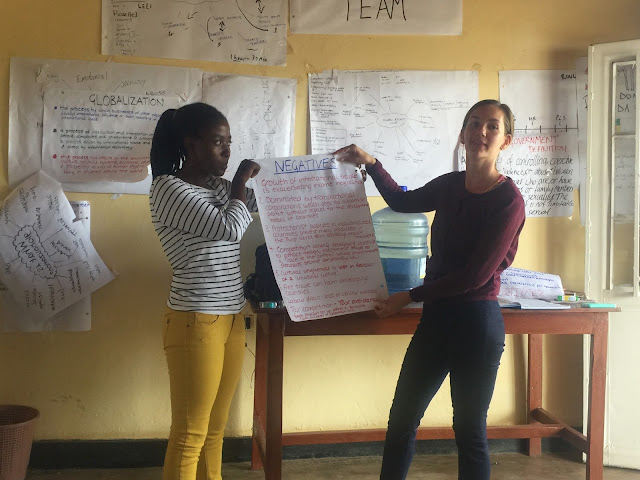Our second Group Reflection session was held on 28th
October and was delivered by Charlotte (UK Volunteer) and Leontine (Rwandan
Volunteer), their topic of choice was Globalisation. As a team, the pair worked
great and the amount of research put into creating an interesting presentation
for the team to observe really did show; there was the perfect mix of fact,
case study and difference of opinion from a cultural background.
The girls began the session by interacting with all team
mates to gain an understanding of the word “Globalisation.” They chose to brainstorm
words as a team we came up with phrases such as – “International business”, “technology”,
“worldwide consumerism”, “McDonalds”, “good” and “bad”; it was interesting to
spectate the difference in opinion from both Rwandan and UK Volunteers. Of
course the two different cultures have grown up in completely different Worlds
and have different experiences in witnessing Globalisation.
With our minds broadened by the group interaction, the girls
went on to educate us on the actual definition of the word and the worldwide
effects; it’s the process that the World is becoming increasingly
interconnected, this is a result of the massively increased trade and cultural exchange.
This happens when businesses of other organisations develop international influence
or start operating on an international scale. Globalisation is a process of
interaction and integration among the people, companies and governments of
different nations, it is driven by international trade and investment and aided
by information technology.
Charlotte and Leontine then went on to advise the group that
the process has effects on the environment, on culture and also on political systems.
We learned from the girls that Globalisation is not new, for thousands of years
people and their later corporations have been buying from and selling to each
other in lands of great distance – such as through the Silk Road: an ancient
network of trade routes that for centuries were central to cultural interaction,
connecting the East and the West – from Asia to Europe.
With the knowledge that this process has been around for
centuries, the girls gave some interesting facts and statistics on how
Globalisation has grown over the last few years:
- Since 1950 the volume of World trade has
increased by 20 times, from just 1997 to 1999 flows of foreign investment
nearly doubled from $468 billion to $827 billion.
- Since WWII and especially in the last 2 decades,
many governments have adopted free market economic systems, vastly increasing
their own productive potential and creating a myriad of new opportunities for
international trade and investment.
- Taking advantage of new opportunities in foreign
markets, corporations have built foreign factories and established production
and marketing arrangements with foreign partners.
With these facts behind us, the group
really had a split opinion of Globalisation – it appeared that the Rwandan side
were still very for it and the side of the UK wary because of the negative
effects they had seen and heard of through the Media around the World. From
this split opinion across the office, presenters Charlotte and Leontine shed
some light on the researched pro’s and con’s of Globalisation on the World.
Some examples of these were:
PRO’S:
- It creates greater opportunities for firms in
less industrialised countries to tap into more and larger markets around the
World.
- This can lead to more access to capital flows,
technology, human capital, cheaper imports and larger export markets.
- It allows businesses in less industrialised
countries to become part of international production networks and supply
chains.
CON’S:
- The growth of international trade is exuberating
income inequalities, both between and within industrialised and less so
nations.
- Global commerce is increasingly dominated by
transnational corporations which seek to maximise profits without regard for
the development needs of individual countries.
- Competition among developing countries to
attract foreign investment leads to a race to the bottom in which countries
dangerously lower environmental standards.
With the facts laid out for the group to see, we all felt
somewhat moved and a little helpless with the craze of Globalisation sweeping
the World more so than it ever has before.
To conclude, the girls went into some negative case studies
involving the likes of Nike and Shell; bringing the group together in similar
opinion. that greed and over-consumption of unnecessary goods have a detrimental
effect on the Natural World, but sadly the human race appear somewhat driven by
these things to a certain degree; with exceptions now rising and speaking up in
cases such as “fairtrade” being enforced, it’s just a shame not all
corporations follow standards such as these.
The next group reflection will be taken by Sarah (UK
Volunteer,) Arron (UK Volunteer) and Alice (Rwandan Volunteer) – they will interestingly
cover the topic of “Positive impact of a post conflict society: A case study of
Rwanda” – a topic close to the heart of all Rwandan Volunteers on our
placement.

No comments:
Post a Comment